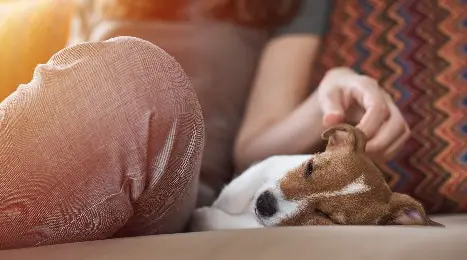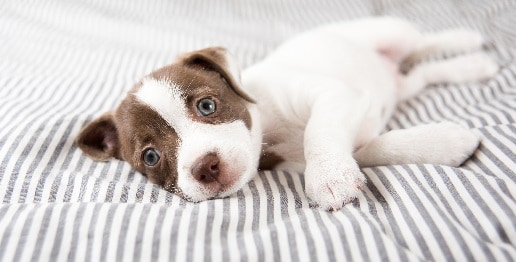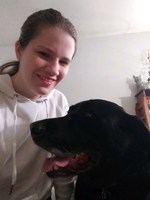If your puppy won’t cuddle right now, they might be feeling too hyper and need exercise. If your puppy never cuddles, they might not like to cuddle. You should never force your puppy to cuddle, but instead let them come to you or choose another activity that they can enjoy.
In this article, I’ll discuss why your puppy won’t cuddle and what to do about it. I’ll also talk about why you shouldn’t force your puppy to cuddle, how else to bond with them, and the importance of puppies having alone time.
Sometimes Puppies are too Hyper to Cuddle
One of the top reasons puppies won’t cuddle is because they’re not feeling tired or relaxed enough. Instead, they are hyper and want to play!
In a puppy’s first months especially, they do a ton of sleeping—but they also do a lot of playing in between that sleep.
Your puppy won’t want to cuddle all of the time, just like you probably don’t want to sit on the couch and cuddle them all day long. Your legs would fall asleep and you wouldn’t have any time to yourself or to be active.
It’s important that puppies do things other than cuddle, such as exercise, eat, and learn to be alone for short periods.
Some Puppies Dislike Cuddling
Of course, there are other puppies who just don’t like cuddling. Maybe when they are feeling sleepy, they’d rather sleep in their crate or on the floor at your feet.
My dog Charlie hasn’t liked to cuddle since I adopted him as a ten month old puppy. Especially when he’s sleeping, he doesn’t want to be touched at all.
This disappointed me at first because I really wanted to snuggle with my new puppy! But instead I had to find other ways to bond with him.
Embracing him for who he is has led to a richer and more meaningful relationship for both of us, even if it isn’t quite what I expected in the beginning.
Puppies’ Personalities aren’t Set
An important thing to note is that puppies’ personalities aren’t set like adult dogs. Just because your puppy doesn’t like cuddling now, doesn’t mean they won’t change their minds in the future.
While you shouldn’t count on this happening, it’s possible that it will.
The reverse can also be true: maybe your puppy liked cuddling when they were younger, and are now growing more independent.
It’s difficult to know the dog your puppy will become. This is why it’s important to adopt a grown dog if you’re looking for a specific set of traits, such as a cuddly dog.
Where puppies are more unpredictable, it’s less likely a grown dog who likes to cuddle will change into one who doesn’t.
Don’t Force Your Puppy to Cuddle
You should never force your puppy to cuddle you.
While there are some things that puppies don’t like but must get used to, cuddling just isn’t one of them. It doesn’t benefit your puppy at all, but only serves to make you happy.
This is the reason that I won’t be sharing how to make a puppy cuddle in this article. While you probably could make this happen, it wouldn’t be a good experience for your pup and would be unfair to them.
Whether your puppy doesn’t like to cuddle at all or doesn’t feel like it at the moment, stop forcing them. Either leave them alone and let them come to you when they like, or try another bonding activity.
There are plenty of ways to bond with your puppy and feel close with them aside from cuddling, which I will go into in detail below.
Puppies may Dislike Cuddling due to Abuse or Medical Problems
It’s possible that your pup has suffered abuse or is currently dealing with an injury or medical condition that makes them dislike being held or touched.
Of course, these scenarios are both less likely in puppies than in older dogs.
Abuse can cause your puppy to feel wary of humans. They may feel fearful or uncomfortable getting too close, or associate human touch with pain.
If your puppy is injured, touching the area can be painful. They might avoid contact with you for this reason.
Lastly, if your puppy isn’t feeling well, they might spend more time by themselves. Just like humans sometimes don’t want to be bothered when sick, your puppy may feel the same way.
If you’re concerned about your puppy’s health, watch for other signs of illness or changes in their behavior and make an appointment with your veterinarian.
Other Ways to Bond with Puppies
Let them Lay Beside You

Instead of cuddling with your puppy held in your lap, they might feel more comfortable laying or sleeping beside you.
Maybe they’ll cuddle into your side or lay at your feet, or maybe your puppy prefers lying next to you but not touching.
Let them decide how close the two of you are to one another instead of forcing anything.
Pet your Puppy
Another great way to bond with your puppy if you’re someone who wants to cuddle them is to pet them.
My dog Charlie doesn’t like cuddles much, but he loves his ears and butt scratched. He’ll also walk up to me often and lie his head in my lap so I can pet his face.
Most puppies love to be pet or scratched, just be sure not to overdo it—if your puppy doesn’t want to cuddle because they’d rather be left alone, respect that and give them some space.
Brush their Coat
The next way to bond with your puppy is by grooming them.
All puppies need to be brushed, and most of them really like it when done right. This age is a perfect time to teach them to love being groomed.
If your pup has long fur, be cautious about pulling too hard on any knotted-up fur. Take your time, be gentle, and offer treats and praise for good behavior.
The best way to avoid a bad experience is to brush or comb your puppy regularly. For long-haired breeds, this may be every day.
Of course, short-haired dogs will have less, if any, snags in their fur. Brushing them once or twice a week is still beneficial to their coats, and it’s a great way to bond with your puppy as well.
Play with your Puppy
Last but certainly not least, make sure your puppy is getting plenty of playtimes! As I discussed earlier, a huge reason puppies don’t want to cuddle is that they’re feeling too energetic to settle down.
Puppies have short but frequent bursts of energy when compared to adult dogs. Many of them can’t handle a long run.
Instead, they may sprint a few laps around the yard and then be ready for a nap—only to wake up ready to do it again!
Bored puppies are much more likely to misbehave, so giving them an outlet for their energy is super important, whether it’s walks around the block, a game of fetch in the back yard, or a little playtime in the living room.
If you’re unsure how much exercise your puppy should be getting, look up the guidelines for their age and breed. You can also ask your veterinarian.
If you’d like to do some research but are unsure of your rescue pup’s breed, try using your best guess or choosing a breed with a similar size and shape.
For instance, my dog is a Black Labrador mix, but I have no idea what other breeds he has in him. When looking for information on his care, I’ve always just referred to information about Labradors.
Be sure to pay attention to things like muzzle and back length as well as height and weight. Puppies with short muzzles get out of breath easily and shouldn’t exercise in the heat. Puppies with long backs and short legs such as Dachshunds or Corgis should avoid jumping and stairs.
When in doubt, speak with your veterinarian and follow their advice.
Puppies Need Alone Time

If you’re anything like me, when you adopt a new puppy you want to be with them around the clock. You’re excited and you love your new furry friend, so it’s only natural.
However, it is important for puppies to have alone time too. There are two reasons for this:
- Some puppies can feel very overwhelmed if they don’t have time to themselves.
- Training a puppy to be alone reduces the chance of them developing separation anxiety.
The first reason is about your puppy’s emotions in the moment. If you’re constantly in their face, or holding them in your lap to cuddle all of the time, your puppy may feel overwhelmed by the attention.
They also might want to do something else with their time, such as playing, like I talked about above.
Giving your puppy a place to go to be alone, like a crate, a dog bed, or even just a spot on the couch or floor, is a good idea.
Try to choose a place that is quiet so that when your puppy is overwhelmed, tired, or just wants some time to themselves, they can retreat to that spot to feel safe.
The second reason comes down to creating a healthy mindset that will last your puppy throughout their life.
It’s very likely that your puppy will need to be alone in the future, even if they don’t now. Maybe you’ll have to go to work or school, or even just out to run errands.
When this happens, you don’t want your puppy to feel panicked. That’s why they should get used to being alone as early as possible so that they learn it’s okay, and that you’ll always come back.
Negative experiences of being left alone, or too rarely being left alone, can cause separation anxiety. This condition makes it incredibly stressful for your pup to be on their own.
Typically separation anxiety occurs when you leave home, but in extreme cases your puppy may feel anxious even if you’re in the next room.
Separation anxiety hurts both you and your pup, and potentially your relationship with them too. The stress can cause problem behaviors like destructive chewing and excessive barking, among other symptoms.
That’s why it’s so important to give your puppy good experiences of being left alone. Start with small amounts of time, such as leaving them in the other room for just a few minutes.
Then, gradually work your way up until your puppy can be on their own for a couple of hours.
Always be sure to puppy-proof your home before leaving your puppy alone, and never leave them for longer than they can handle.
For example, you shouldn’t leave a two-month-old puppy for more than two hours.
Writer: Katelynn Sobus


